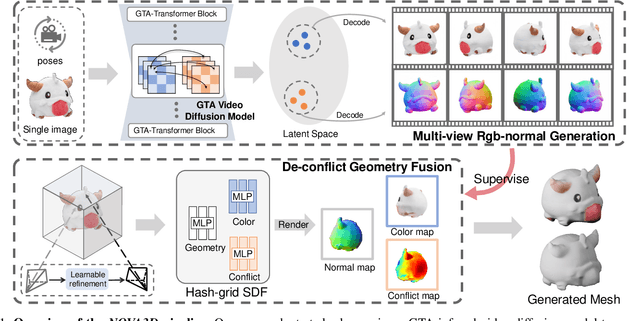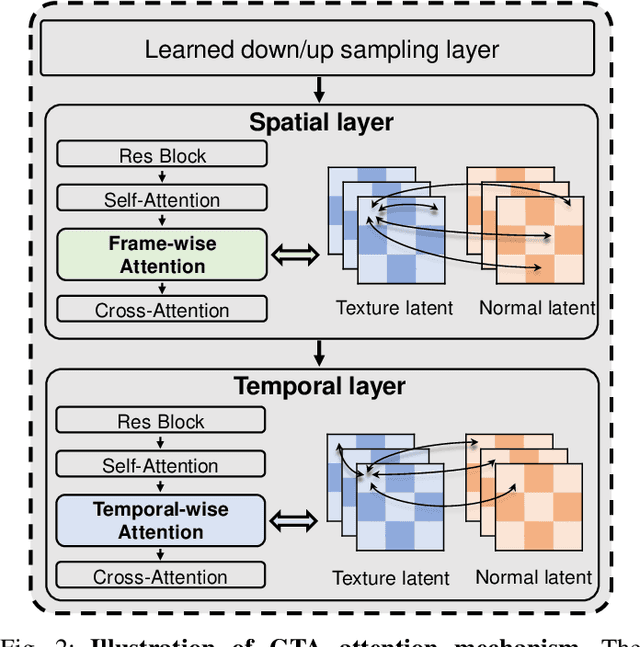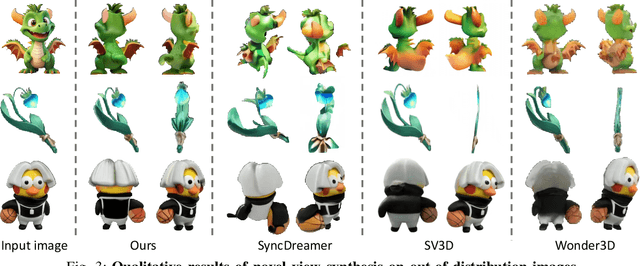Yuxiao Yang
EchoMotion: Unified Human Video and Motion Generation via Dual-Modality Diffusion Transformer
Dec 21, 2025Abstract:Video generation models have advanced significantly, yet they still struggle to synthesize complex human movements due to the high degrees of freedom in human articulation. This limitation stems from the intrinsic constraints of pixel-only training objectives, which inherently bias models toward appearance fidelity at the expense of learning underlying kinematic principles. To address this, we introduce EchoMotion, a framework designed to model the joint distribution of appearance and human motion, thereby improving the quality of complex human action video generation. EchoMotion extends the DiT (Diffusion Transformer) framework with a dual-branch architecture that jointly processes tokens concatenated from different modalities. Furthermore, we propose MVS-RoPE (Motion-Video Syncronized RoPE), which offers unified 3D positional encoding for both video and motion tokens. By providing a synchronized coordinate system for the dual-modal latent sequence, MVS-RoPE establishes an inductive bias that fosters temporal alignment between the two modalities. We also propose a Motion-Video Two-Stage Training Strategy. This strategy enables the model to perform both the joint generation of complex human action videos and their corresponding motion sequences, as well as versatile cross-modal conditional generation tasks. To facilitate the training of a model with these capabilities, we construct HuMoVe, a large-scale dataset of approximately 80,000 high-quality, human-centric video-motion pairs. Our findings reveal that explicitly representing human motion is complementary to appearance, significantly boosting the coherence and plausibility of human-centric video generation.
Target-Balanced Score Distillation
Nov 12, 2025Abstract:Score Distillation Sampling (SDS) enables 3D asset generation by distilling priors from pretrained 2D text-to-image diffusion models, but vanilla SDS suffers from over-saturation and over-smoothing. To mitigate this issue, recent variants have incorporated negative prompts. However, these methods face a critical trade-off: limited texture optimization, or significant texture gains with shape distortion. In this work, we first conduct a systematic analysis and reveal that this trade-off is fundamentally governed by the utilization of the negative prompts, where Target Negative Prompts (TNP) that embed target information in the negative prompts dramatically enhancing texture realism and fidelity but inducing shape distortions. Informed by this key insight, we introduce the Target-Balanced Score Distillation (TBSD). It formulates generation as a multi-objective optimization problem and introduces an adaptive strategy that effectively resolves the aforementioned trade-off. Extensive experiments demonstrate that TBSD significantly outperforms existing state-of-the-art methods, yielding 3D assets with high-fidelity textures and geometrically accurate shape.
Multimodal LLMs for Visualization Reconstruction and Understanding
Jun 26, 2025Abstract:Visualizations are crucial for data communication, yet understanding them requires comprehension of both visual elements and their underlying data relationships. Current multimodal large models, while effective in natural image understanding, struggle with visualization due to their inability to decode the data-to-visual mapping rules and extract structured information. To address these challenges, we present a novel dataset and train multimodal visualization LLMs specifically designed for understanding. Our approach combines chart images with their corresponding vectorized representations, encoding schemes, and data features. The proposed vector format enables compact and accurate reconstruction of visualization content. Experimental results demonstrate significant improvements in both data extraction accuracy and chart reconstruction quality.
NOVA3D: Normal Aligned Video Diffusion Model for Single Image to 3D Generation
Jun 09, 2025



Abstract:3D AI-generated content (AIGC) has made it increasingly accessible for anyone to become a 3D content creator. While recent methods leverage Score Distillation Sampling to distill 3D objects from pretrained image diffusion models, they often suffer from inadequate 3D priors, leading to insufficient multi-view consistency. In this work, we introduce NOVA3D, an innovative single-image-to-3D generation framework. Our key insight lies in leveraging strong 3D priors from a pretrained video diffusion model and integrating geometric information during multi-view video fine-tuning. To facilitate information exchange between color and geometric domains, we propose the Geometry-Temporal Alignment (GTA) attention mechanism, thereby improving generalization and multi-view consistency. Moreover, we introduce the de-conflict geometry fusion algorithm, which improves texture fidelity by addressing multi-view inaccuracies and resolving discrepancies in pose alignment. Extensive experiments validate the superiority of NOVA3D over existing baselines.
Hindsight Planner: A Closed-Loop Few-Shot Planner for Embodied Instruction Following
Dec 27, 2024



Abstract:This work focuses on building a task planner for Embodied Instruction Following (EIF) using Large Language Models (LLMs). Previous works typically train a planner to imitate expert trajectories, treating this as a supervised task. While these methods achieve competitive performance, they often lack sufficient robustness. When a suboptimal action is taken, the planner may encounter an out-of-distribution state, which can lead to task failure. In contrast, we frame the task as a Partially Observable Markov Decision Process (POMDP) and aim to develop a robust planner under a few-shot assumption. Thus, we propose a closed-loop planner with an adaptation module and a novel hindsight method, aiming to use as much information as possible to assist the planner. Our experiments on the ALFRED dataset indicate that our planner achieves competitive performance under a few-shot assumption. For the first time, our few-shot agent's performance approaches and even surpasses that of the full-shot supervised agent.
MVReward: Better Aligning and Evaluating Multi-View Diffusion Models with Human Preferences
Dec 09, 2024



Abstract:Recent years have witnessed remarkable progress in 3D content generation. However, corresponding evaluation methods struggle to keep pace. Automatic approaches have proven challenging to align with human preferences, and the mixed comparison of text- and image-driven methods often leads to unfair evaluations. In this paper, we present a comprehensive framework to better align and evaluate multi-view diffusion models with human preferences. To begin with, we first collect and filter a standardized image prompt set from DALL$\cdot$E and Objaverse, which we then use to generate multi-view assets with several multi-view diffusion models. Through a systematic ranking pipeline on these assets, we obtain a human annotation dataset with 16k expert pairwise comparisons and train a reward model, coined MVReward, to effectively encode human preferences. With MVReward, image-driven 3D methods can be evaluated against each other in a more fair and transparent manner. Building on this, we further propose Multi-View Preference Learning (MVP), a plug-and-play multi-view diffusion tuning strategy. Extensive experiments demonstrate that MVReward can serve as a reliable metric and MVP consistently enhances the alignment of multi-view diffusion models with human preferences.
Can the Inference Logic of Large Language Models be Disentangled into Symbolic Concepts?
Apr 03, 2023



Abstract:In this paper, we explain the inference logic of large language models (LLMs) as a set of symbolic concepts. Many recent studies have discovered that traditional DNNs usually encode sparse symbolic concepts. However, because an LLM has much more parameters than traditional DNNs, whether the LLM also encodes sparse symbolic concepts is still an open problem. Therefore, in this paper, we propose to disentangle the inference score of LLMs for dialogue tasks into a small number of symbolic concepts. We verify that we can use those sparse concepts to well estimate all inference scores of the LLM on all arbitrarily masking states of the input sentence. We also evaluate the transferability of concepts encoded by an LLM and verify that symbolic concepts usually exhibit high transferability across similar input sentences. More crucially, those symbolic concepts can be used to explain the exact reasons accountable for the LLM's prediction errors.
 Add to Chrome
Add to Chrome Add to Firefox
Add to Firefox Add to Edge
Add to Edge